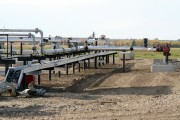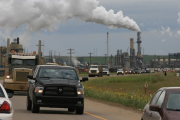Simon Dyer is the deputy executive director of the Pembina Institute. Simon Langlois-Bertrand is a research associate at the Trottier Energy Institute.
This year, you may have noticed, there’s been no shortage of rhetoric about the emissions that come from Canada’s oil and gas industry.
Much of the discussion has come down to one question: how do we balance the need to reduce oil and gas emissions with the role the sector currently plays in Canada’s economy?
If the rhetoric you’ve heard this year has given you the impression that it is a choice between a booming oil and gas industry and emissions reduction policies that curb productivity and have a negative impact on our economy, then we’d respectfully suggest you’ve been sold a false choice.
First, when we talk about the economic contribution of oil and gas, it’s important to deal in real numbers. On average, since 2000, oil and gas has contributed about 5 per cent (or one-20th) of Canada’s GDP. While that’s not insignificant, we should consider how it compares with the 31 per cent (or almost one-third) of Canada’s overall emissions that come from oil and gas production.
Those emissions have a real cost. According to the Canadian Climate Institute, a typical storm or flood that cost roughly $8-million in the early 1970s now costs more than $110-million. Regardless of whether you experience a wildfire or flood in your community (and many Canadians, tragically, have in the past few years), more frequent climate-related disasters are something we’re all going to be paying for in the decades ahead, in terms of heightened insurance premiums and disruption that causes losses to our economy’s growth. The oil and gas industry, with its outsized contribution to climate-changing greenhouse gas emissions, should be expected to do its fair share in limiting future damage, and future costs.
The second thing to note is that the sector is not pulling its weight in that regard. Despite years of environmental promises, advertised to Canadians through various iterations of industry groupings and alliances, oil and gas emissions are still going up. In the oil sands in particular – a subsector that is almost entirely operated by six large companies – emissions have increased by 142 per cent since 2005. This is partly owing to increased levels of production, and the industry often cites improvements to emissions-per-barrel (known as emissions intensity) as the better barometer of environmental performance. But in the past six years, progress in this area has flatlined too.
This compares with an overall fall in Canada’s emissions during the same period, showing that the oil and gas industry is now out of step with progress being made across other areas of our economy. Without additional targeted regulation, it is hard to see how this will change.
If Canada wants a clean, competitive economy into the 2030s and beyond, we need to quickly get all of our oil and gas sector – including the oil sands – on the right track. The world is lowering its fossil-fuel dependence. We can debate exactly when the demand decline will begin, but all indications are that the uptake of cheaper alternatives to oil and gas uses today (such as home heat pumps, electric vehicles, and a larger share of renewables to power the world’s electricity grids) is going to keep accelerating. Canada does not set the pace of the global energy transition, but it must take action to be in lockstep with its effects – and that includes recognizing that the jobs, tax revenues and royalty payments that the oil and gas industry has recently been highlighting through various advertising campaigns will be affected by it.
As Canada develops new industrial sectors and transforms its economy to seize the opportunities of this global transition, we are also going to need a leaner, cleaner oil and gas sector – where we produce less oil and gas overall, and a larger share isn’t burned as fuel but is used as feedstock for low-carbon petrochemicals and other materials. How much of the oil and gas industry – and how many jobs – we hold on to will depend on whether companies today invest in the emissions reduction projects that will future-proof the sector to compete in that changing market. But these investments will not materialize without regulations.
Regulating the oil and gas sector is not a road to economic destruction, but a prudent choice to opt in to the prosperous clean-energy future that all Canadians deserve.







